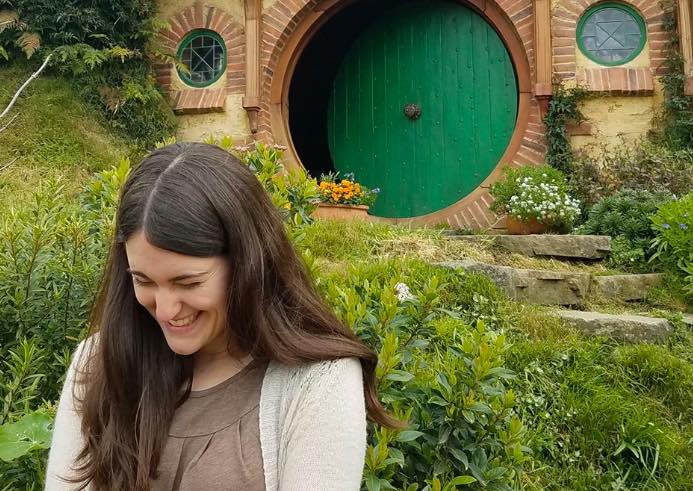
God Doesn't Owe Me a Spouse
Ah, Christian Mingle, you thought you were so clever, targeting your Facebook ad to a 20-something woman who has posted about her faith on social media.
It’s too bad your algorithm didn’t know I was once a teenage girl who, when told to write a letter to her future husband, scribbled, “Dear Future Husband, Why are we doing this? It feels selfish, like you’re supposed to be a long list of things I want, when I don’t even know if you exist. (No offense.) If you are out there, keep doing what God wants you to do, I guess. I’ll do the same. We’ll talk later.”
Who, two Christmases ago when I was single, responded to a sweet relative’s concern that I wasn’t dating someone with, “So, I’m just curious: what do you believe about the sovereignty of God?” (which was absolutely not the best response but also hilarious).
And who has a particularly strong radar for heresy on Mondays. Because if you’d known all that, you probably wouldn’t have targeted me with this particular ad.

I’m mostly focusing on the verse written over the proposal image here. The other photos in the slideshow ad display the rest of Luke 11:9: “Ask and it will be given to you; seek and you will find; knock and the door will be opened to you.”
I’m not criticizing online dating, but I am 100% criticizing the application of this verse to imply that God will give you the man or woman of your dreams if you just ask (click), seek (sign up and pay) and knock (connect with matches). I could talk about how the entire rest of the Bible is full of clarifications on this. Every promise in the Bible gets less commercial and cutesy when you step back from it and look at the context…but also larger and more amazing.
- Psalm 37, tells us “Take delight in the Lord, and he will give you the desires of your heart,” followed by a list of what desires your changed heart will have, including justice, righteousness, and self-control.
- Jeremiah 29:11 says, “I know the plans I have for you,” but we forget that the plans in that original context involved toiling away in exile in a foreign land.
- Romans 8:28 reminds us that “God works all things together for good for those who love him” and was written by a man who was persecuted and executed for his faith.
- Philippians 4:13’s triumphant “I can do all things through Christ who gives me strength” is the ending of a conversation about being able to find contentment in every kind of hard situation.
Even the immediate context of Luke 11 tells us Jesus wasn’t peddling a wish-fulfillment service. After talking about how fathers love to give good gifts to their children, Jesus says, “How much more will your Father in heaven give the Holy Spirit to those who ask him!”
God does sometimes give his children other gifts—everything from our daily bread to a loving spouse to miraculous healing—but here he’s talking about giving believers the Holy Spirit.
Which means he’s promising to give us wisdom to understand the Bible, grace to better love and serve others, and conviction in the areas of our lives where we’ve gotten too comfortable with sin. That’s an amazing promise…but not one that’s going to sell an online dating platform.
Neither is this, but I’m going to say it anyway, and say it loud because there are a lot of flashy voices trying to yell the opposite, some draped in prosperity-gospel-glitz, others disguised in faux-Proverbs-31-femininity: God does not owe me happiness. Or any specific thing that I or my culture has decided I need to be happy. The American dream. A job that is also a “passion.” Health and wealth. Even marriage and kids.
Could he give me all of those things? Sure. Do I cheer when I hear stories of believers who are thankful for these gifts? Of course. But God doesn’t have to give me any of that, and sometimes he doesn’t, for reasons that are way bigger than me or my wishlist.
That sounds harsh, and listen, I’ve had my moments and seasons of searching—for good things like community or purpose—that took longer than I wanted or didn’t ever arrive the way I wanted them to. I’ve worn my knuckles out knocking on heaven’s door for everything from good weather to the salvation of people I love, but sometimes the answer is “no” (or at least “not yet,” which without a timeline looks like the same thing from my perspective).
But one passage I come back to when I feel like that’s unfair or that I have a right for God to approve of my plan (this happens fairly often) is when Jesus prays in Gethsemane, right before his death, “My Father, if it is possible, may this cup be taken from me.”
Jesus asked. He sought. He knocked. And God answered, but the door stayed shut, because it was not God’s will. Jesus had to die for us. There was no other way. And so Jesus said, “Not my will, but yours be done.”
If “Everyone who asks receives” means that God will always approve our plans and grant our desperate longings…then it didn’t even work out for Jesus.
What do we do with this kind of God? The one who doesn’t promise health and wealth, but in fact tells us we’re going to suffer in this life? The one who could say no to what we see as a good and beautiful dream? The one who might not deliver a spouse or any other blessing if we click a button and have enough faith? We worship.
Because I do not want to believe in a God who structures the world around my wants and whims, who never lets me experience the growth that comes with loss or longing, who is only barely big enough to respond to whatever vending machine button I happen to be pushing. That sort of God is no God at all.
What seems at first to be unfair fine print on an open-ended promise is actually large print written over every page of the Bible and human history: GOD IS GOD AND I AM NOT. And that is a very, very good thing.

Amy Lynn Green writes, plays board games, and tries to stay warm from her home in Minneapolis, Minnesota. Her book, Things We Didn’t Say, an epistolary novel set in the WWII homefront, releases in November 2020. Connect with her on Facebook, Instagram, or amygreenbooks.com.





